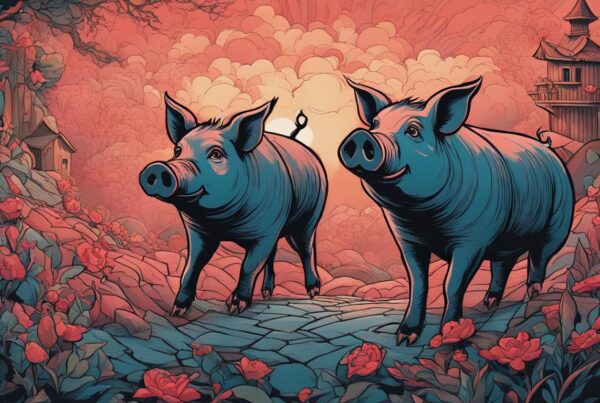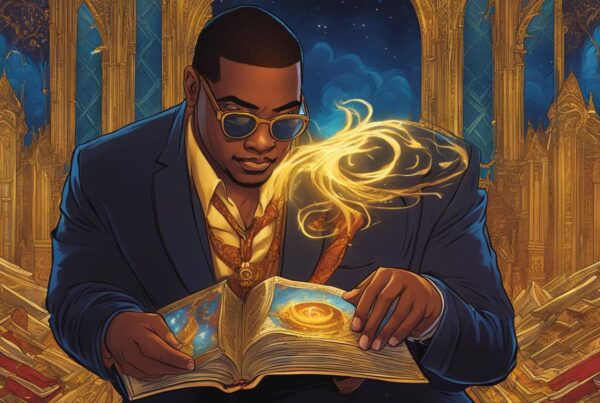Positively 4th Street, written by David Hajdu, is a captivating exploration of the lives and relationships of legendary musicians Bob Dylan and the Baez siblings, Joan and Mimi. This book provides readers with a unique glimpse into the Greenwich Village folk scene in the early sixties, shedding light on the intricate dynamics, rivalries, and impact of these influential figures.
Delving into Dylan’s early years and the connections between these key players, Positively 4th Street offers a sociocultural history of a period marked by both joy and turmoil. It explores how their relationships and personal struggles shaped their music, politics, and the counterculture movement of the time, ultimately leaving a lasting legacy and impact on the music industry.
Key Takeaways:
- Positively 4th Street delves into the intertwining lives of Bob Dylan and the Baez siblings, Joan and Mimi, providing a unique perspective on the folk music era.
- The book explores the complicated dynamics, rivalries, and influence that existed between these influential figures and their impact on each other’s lives.
- Positively 4th Street examines how Bob Dylan and Joan Baez’s music became intertwined with politics, inspiring social change and activism.
- It delves into the life and legacy of Richard Farina, a significant figure in the Greenwich Village folk scene, and his complex relationship with Dylan.
- The impact of drugs and fame on Dylan’s personal life is also explored, shedding light on the challenges and complexities he faced during this period.
The Key Players: Bob Dylan, Joan Baez, and Mimi Baez Farina
Positively 4th Street introduces readers to the main characters of the book – Bob Dylan, Joan Baez, and Mimi Baez Farina. It highlights their roles in the Greenwich Village folk scene, their personal relationships, and their impact on the music industry. Joan Baez was known as the Queen of Folk, with her classical style and captivating voice, while Bob Dylan emerged as a brilliant musician and writer. Mimi Baez Farina, Joan’s younger sister, was also a talented singer and guitarist who married Richard Farina, a writer and folk musician. The book explores the complex dynamics between these individuals and their influence on each other’s lives.
Joan Baez, with her mesmerizing voice and classical style, earned the title of the Queen of Folk. Bob Dylan, on the other hand, captivated audiences with his extraordinary musical talent and poetic songwriting. Their presence in the Greenwich Village folk scene played a pivotal role in shaping its history and culture.
Mimi Baez Farina, Joan’s younger sister, was not only an accomplished singer but also a skilled guitarist. Her marriage to Richard Farina, a writer and folk musician, added another layer of complexity to the relationships within this influential group. Together, these individuals formed a creative and dynamic powerhouse that left an indelible mark on the music industry.
The intertwining lives of Bob Dylan, Joan Baez, and Mimi Baez Farina offer readers a glimpse into the vibrant folk music era of the early sixties. Their stories, relationships, and contributions provide a fascinating narrative that brings the Greenwich Village folk scene to life.
The Relationships and Rivalries
Positively 4th Street delves into the relationships and rivalries that existed between Bob Dylan, Joan Baez, Mimi Baez Farina, and Richard Farina. It explores the complicated dynamics of these individuals who were not only creatively ambitious but also competitive and jealous of each other.
Bob Dylan, known for his groundbreaking music and poetic lyrics, had significant connections with both Joan Baez and Mimi Baez Farina. His relationships with these talented women created tensions and complexities within their intertwined lives. Dylan’s magnetic personality and rising fame stirred emotions and triggered jealousies among the Baez sisters and Richard Farina.
Joan Baez, often referred to as the “Queen of Folk,” was a prominent figure in the folk music scene, and her romance with Dylan made headlines. The intense bond between Dylan and Joan not only fueled their artistic endeavors but also generated rivalries and emotional turbulence. As Dylan’s star rose, Mimi Baez Farina, Joan’s younger sister, also became involved with Dylan, deepening the web of relationships and intensifying the rivalries between the individuals.
Richard Farina, a talented folk musician and writer, played a significant role in the Greenwich Village scene. His marriage to Mimi Baez Farina further complicated the intricate relationships among Dylan, Joan, Mimi, and Richard. With his own ambitions and creative pursuits, Richard often found himself envious of Dylan’s musical success, adding fuel to the rivalries and tensions within the group.
The book intricately explores the personal lives, romances, and artistic collaborations of these individuals, shedding light on the complex dynamics that shaped their relationships and ultimately influenced their music. From love triangles to artistic rivalries, Positively 4th Street provides a fascinating account of the intricate web of connections and conflicts among Bob Dylan, Joan Baez, Mimi Baez Farina, and Richard Farina.

The Relationships and Rivalries – Key Highlights:
- Bob Dylan’s romantic relationships with both Joan Baez and Mimi Baez Farina created tension and emotional complexities.
- The love triangles and intense bonds influenced the personal lives and artistic endeavors of all involved.
- Richard Farina’s envy of Dylan’s musical success added to the rivalries and tensions in the group.
- Positively 4th Street provides a detailed exploration of these relationships and their impact on the music and lives of those involved.
| Relationships and Rivalries | Key Points |
|---|---|
| Bob Dylan | Romantic relationships with both Joan Baez and Mimi Baez Farina. |
| Joan Baez | Involved with both Bob Dylan and Richard Farina, leading to complex dynamics. |
| Mimi Baez Farina | Connected to Bob Dylan and married to Richard Farina, contributing to the rivalries. |
| Richard Farina | Envious of Dylan’s musical success and engaged in a love triangle with Joan Baez and Mimi Baez Farina. |
The Impact on Music and Politics
Positively 4th Street delves into the profound impact that Bob Dylan and Joan Baez’s music had on both the music industry and the political landscape of their time. Renowned for their activism and impassioned lyrics, Dylan and Baez used their songs as a platform to address social injustices and advocate for change.
Throughout their careers, Dylan and Baez fearlessly embraced their roles as influential musicians and political activists. Their music resonated deeply with audiences, inspiring a generation to question authority and fight for justice. They became the voices of a movement that sought to challenge the status quo and usher in a new era of social consciousness.
In the turbulent 1960s, Dylan and Baez stood at the forefront of the folk music revival. Their impactful songs addressed pressing issues such as civil rights, war, and inequality. Through their music, they captured the essence of the counterculture movement, giving a voice to the disenfranchised and marginalized.
“To live outside the law, you must be honest.” – Bob Dylan
Positively 4th Street sheds light on the transformative journey of Bob Dylan, as he transitioned from overtly political songwriting to a more introspective and poetic style. This evolution cemented his status as a musical genius and further solidified his impact on the music industry.
The Cultural Significance
The music and political activism of Dylan and Baez had an enduring impact on not only their contemporaries but also future generations of musicians and activists. Their powerful messages still resonate today, reminding us of the power of music to drive social change.
By weaving together the threads of music and politics, Positively 4th Street reveals how Bob Dylan and Joan Baez left an indelible mark on the cultural landscape of their time. Their profound impact continues to shape the music industry and inspire artists to use their voices as catalysts for social and political transformation.
The Teaser Chart
| Impact of Bob Dylan and Joan Baez’s Music on Music and Politics | |
|---|---|
| Inspired a generation to challenge social injustices | ✓ |
| Addressed pressing issues such as civil rights and war | ✓ |
| Propelled the folk music revival and counterculture movement | ✓ |
| Transitioned from overtly political to introspective songwriting | ✓ |
| Continues to inspire musicians and activists today | ✓ |
Richard Farina: The Man and the Myth
Richard Farina was a significant figure in the Greenwich Village folk scene, and his life and contributions are explored in depth in Positively 4th Street. This biography delves into Farina’s upbringing, travels, and involvement in political and literary circles, offering readers a comprehensive understanding of his background and influences. As a musician, writer, and husband to Mimi Baez Farina, Richard Farina played a pivotal role in the folk music era.
However, Richard Farina’s story is not without its myths and legends. The book examines the self-created persona that Farina cultivated and the impact of his tragic death on his legacy. Through meticulous research and analysis, Positively 4th Street unravels the complexities surrounding this enigmatic figure, allowing readers to separate fact from fiction and gain new insights into Richard Farina’s life and contributions.

Richard Farina’s mysterious and charismatic persona continues to captivate folk music enthusiasts, and his influence lingers to this day. By delving into his biography and dispelling myths, Positively 4th Street offers readers a deeper understanding of Richard Farina and his significant impact on the Greenwich Village folk scene.
Dylan and Farina: The Rivalry and Influence
Positively 4th Street delves into the fascinating rivalry and influential relationship between Bob Dylan and Richard Farina. As two immensely talented musicians in the Greenwich Village folk scene, their competitive spirits fueled their artistic growth and creativity.
Dylan, known for his unparalleled songwriting abilities, couldn’t help but feel envious of Farina’s talent for writing. This envy even compelled Dylan to venture into the literary world by penning his own book, Tarantula. Meanwhile, Farina, who was married to Mimi Baez Farina, Joan Baez’s younger sister, aspired to establish himself as a notable musician.
Their rivalry was not based solely on jealousy, but on mutual admiration as well. Each artist pushed the other to reach new heights and explore different dimensions of their craft. Dylan’s groundbreaking music and poetic lyrics inspired Farina to expand his own artistic boundaries. Likewise, Farina’s unique folk style and creative approach influenced Dylan, leaving an indelible mark on his music.
“Bob Dylan and Richard Farina were like two sides of the same coin. Their rivalry was a driving force behind their creative output, constantly pushing them to refine their craft and search for new expressions of art.” – Critic
This dynamic relationship between Dylan and Farina had a profound impact on the folk music scene and beyond. Their innovative approaches and daring experimentation ultimately broadened the horizons of folk music, paving the way for new genres and artistic movements.
| Bob Dylan | Richard Farina |
|---|---|
| Renowned singer-songwriter | Talented writer and musician |
| Jealous of Farina’s writing abilities | Envious of Dylan’s musical success |
| Pushed the boundaries of folk music | Influenced Dylan’s musical style |
| Wrote “Tarantula”, inspired by Farina | Aspired to establish himself as a musician |
Joan Baez: From Folk Singer to Political Activist
Positively 4th Street delves into the transformation of Joan Baez from a folk singer to a political activist. Baez’s early folk career showcased her traditional singing style and marked the beginning of her rise to prominence in the music industry. However, it was her growing involvement in political causes that truly shaped her identity and cemented her status as a powerful voice for change.
Joan Baez used her music and platform to advocate for social justice and inspire a generation. She became an influential figure in the civil rights movement, using her talent and charisma to shed light on issues of racial inequality and injustice. Baez’s powerful voice and heartfelt lyrics resonated with audiences around the world, propelling her to the forefront of the folk music scene.
As the anti-war movement gained momentum during the Vietnam War era, Baez became an outspoken critic of the conflict. She used her platform to raise awareness about the devastating impacts of war and actively protested against American involvement in Vietnam. Baez’s activism was fueled by her unwavering commitment to peace and her belief in the power of music as a vehicle for social change.
Throughout her career, Joan Baez fearlessly tackled important issues through her music and public appearances. Whether she was performing at political rallies or using her voice to amplify the voices of the marginalized, Baez consistently used her platform for the greater good. Her unwavering dedication to activism solidified her status as a political activist in addition to being a highly respected folk singer.
“People like Joan Baez…used music as a way to help their causes…They made people stop and think about things.” – Bob Dylan
Joan Baez’s transformation from folk singer to political activist remains a key aspect of her legacy. Her contributions to both the music industry and the political landscape have left an indelible mark on history. Baez’s ability to merge her passion for folk music with her commitment to social justice continues to inspire generations of artists and activists today.
The Impact of Drugs and Fame
Positively 4th Street examines the profound impact of drugs and fame on the personal life of Bob Dylan. Like many artists of the time, Dylan delved into experimentation with drugs and faced the ensuing consequences. The book offers insights into how Dylan’s meteoric rise to fame affected his behavior, leading to periods characterized by meanness and craziness. His increasing notoriety and the pressures that accompanied it took a toll on his personal relationships.
Dylan’s relationships with various women, including his well-known breakups with Joan Baez and Sara Lownds, are dissected in the book, shedding light on the complexities of his personal life. The intense scrutiny of the media and relentless pursuit of the spotlight eventually led Dylan to retreat from the public eye, seeking solace and an escape from the chaotic whirlwind of fame.
This section of Positively 4th Street provides readers with an intimate glimpse into the struggles, temptations, and self-discoveries Dylan encountered in the midst of his drug-fueled fame. It offers a nuanced portrayal of the significant impact of drugs and the relentless pursuit of fame on the personal life of one of music’s most iconic figures, Bob Dylan.
The Legacy of Positively Fourth Street
Positively 4th Street explores the lasting impact and legacy of the events and individuals discussed in the book. It delves into the continued influence of Bob Dylan, Joan Baez, and the Baez and Farina families on the music industry and the broader cultural landscape.
The book reflects on the enduring significance of the Greenwich Village folk scene, which served as a crucible for creativity and inspiration during the 1960s. This vibrant community laid the foundation for the development of folk rock and played a pivotal role in shaping the counterculture movement of the era.
Bob Dylan’s innovative songwriting and electrifying performances paved the way for future generations of musicians, leaving an indelible mark on popular music. Joan Baez’s captivating voice and passionate political activism infused her music with a powerful message that resonated with audiences around the world. The Baez and Farina families, through their talent and contributions, added another layer of innovation and artistry to the folk music landscape.
The legacy of Positively Fourth Street is the lasting impact it has had on our understanding of this transformative period in music history. Through detailed research and compelling storytelling, the book provides a deeper understanding of how these individuals and the Greenwich Village scene influenced not only the music industry but also social and cultural change. Their influence can still be felt today as their music continues to inspire and resonate with audiences worldwide.
By uncovering the legacy of Positively Fourth Street, readers gain valuable insights into the enduring impact of an era that continues to shape art, music, and society as we know it.
Critical Reception and Reviews
Positively 4th Street, written by David Hajdu, garnered widespread critical acclaim upon its release. The book’s meticulous research, captivating storytelling, and insightful analysis of the lives and relationships of Bob Dylan, Joan Baez, and the Baez and Farina families have been regarded as significant contributions to the genre of music biography.
Reviewers praised Positively 4th Street for its ability to shed light on the Greenwich Village folk scene and its profound impact on music and society. The book’s compelling narrative provides readers with a deeper understanding of the sociocultural history of the era and the intricate dynamics between these influential figures.
“Positively 4th Street is a remarkable exploration of the intertwining lives of Bob Dylan, Joan Baez, and the Baez and Farina families. Hajdu’s attention to detail and vivid storytelling make this book a must-read for anyone interested in the folk music era.”
The book’s critical reception further highlights its significance within the genre. Critics commended Hajdu’s ability to present a comprehensive and engaging account of the Greenwich Village folk scene, providing readers with a firsthand glimpse into the cultural revolution that unfolded during this period.
Positively 4th Street’s enduring legacy as a well-regarded music biography is a testament to its comprehensive exploration of the era, its meticulous research, and its ability to captivate readers with its vivid storytelling.
Conclusion
Positively 4th Street by David Hajdu provides readers with a captivating book summary that delves into the lives and relationships of iconic figures such as Bob Dylan, Joan Baez, and the Baez and Farina families. This insightful exploration takes readers on a journey through the Greenwich Village folk scene of the 1960s, unraveling the intricate connections between music, politics, and the counterculture movement.
The book’s detailed research and engaging storytelling offer readers a richly textured sociocultural history of this transformative era. By examining personal relationships, rivalries, and the impact of drugs and fame, Positively 4th Street presents a comprehensive and nuanced understanding of the individuals who shaped the folk music landscape.
Positively 4th Street leaves a lasting legacy by showcasing the enduring influence of Bob Dylan, Joan Baez, and the Baez and Farina families on both the music industry and society as a whole. Through their activism and powerful messages, these individuals inspired change and became synonymous with the spirit of a generation.



